Want to see more? Check out PPT’s YouTube Channel for gun reviews and more!
JRA Gallant Pros & Cons
Pros
- Good recoil mitigation
- Solid reliability
- Accurate
Cons
- Heavy
- Limited accessories
The Bottom Line
The JRA Gallant is a heavy, accurate, and reliable battle rifle dripping with old-school cool.
In the battle space, there are some hard truths when it comes to equipment. If your enemy has a weapon that functions better in a particular theatre, you should study it and learn from it.
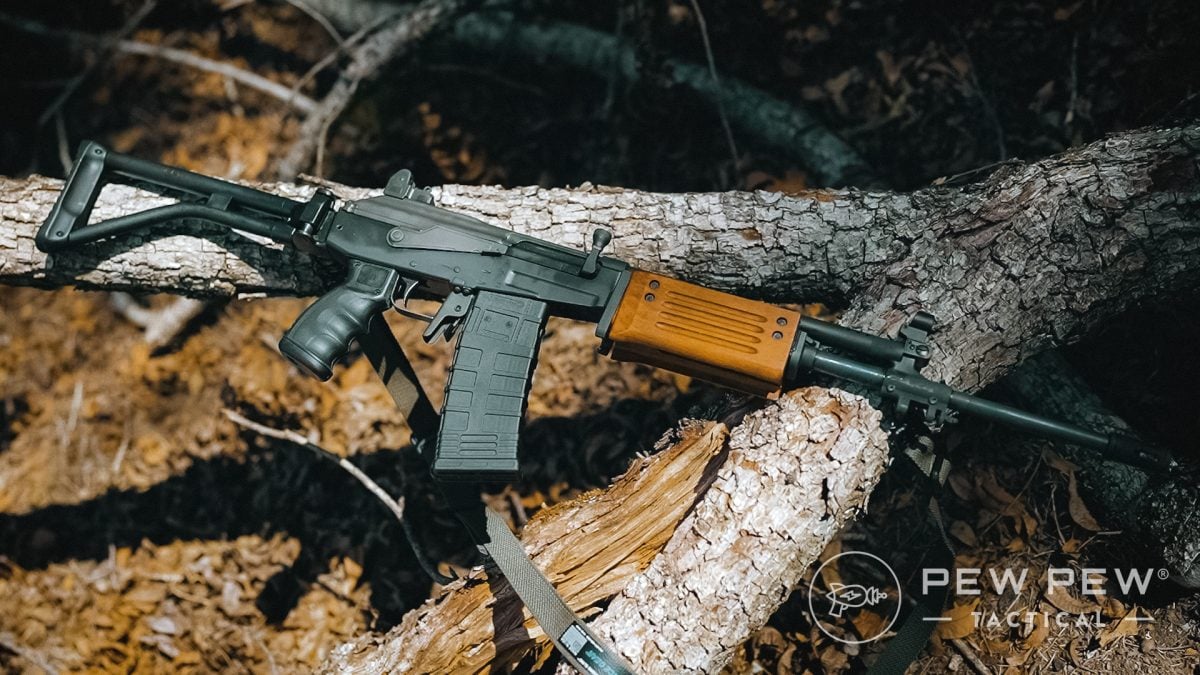
We can agree this practice may win future conflicts, but how does it apply to the James River Armory Gallant? We got our hands on one and ran it through our process to see how it would perform.
We’ll share the results, along with how the Gallant is tied to the Galil, and even the AK-47, below. So read on!
Table of Contents
Loading…
Prices accurate at time of writing
Prices accurate at time of writing
-
25% off all OAKLEY products - OAKLEY25
Copied! Visit Merchant
JRA Gallant Specs & Features
Specs
- Caliber: 5.56x45mm
- Action: Semi-auto, long stroke gas piston
- Capacity: 30+1 (or by magazine)
- Length: 38.4”
- Barrel Length: 18”
- Width: 2.1”
- Height: 8.3”
- Weight: 8 lbs. 13 oz.
- Country of origin Israel/USA
- Comes with: Plastic case, Tapco 30-round magazine, owner’s manual, gun lock
Features
- Folding Stock
- Long stroke, gas piston system
- Spring-loaded firing pin
Gallant Background
The James River Armory Gallant is, in essence, a rebuilt Galil. These firearms began life in Israel as Galils, then were shipped to the United States, where James River Armory updated them to comply with 922r regulations.
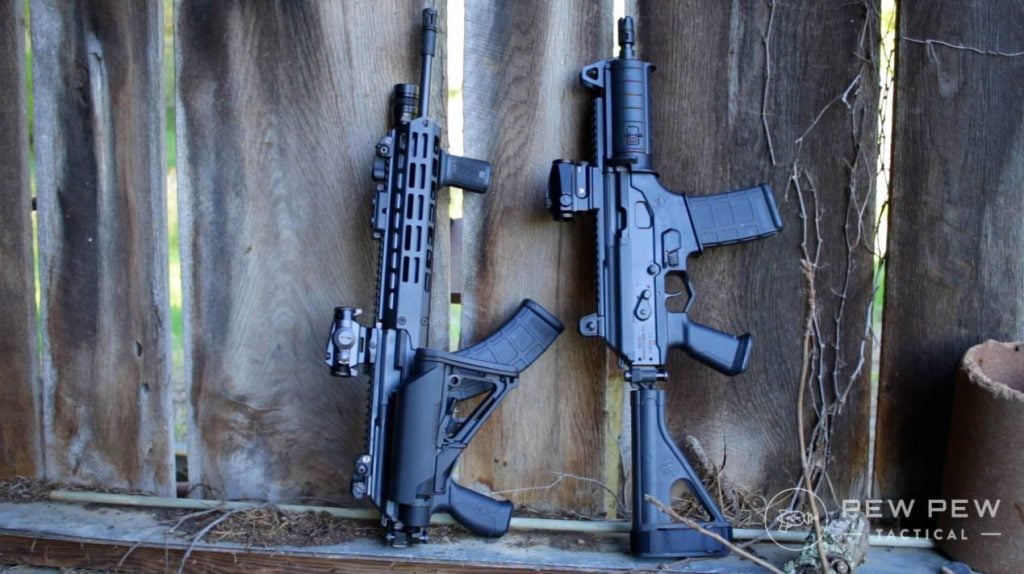
The Gallant is a combination of prior Galil pieces and a new billet steel receiver, along with a new 18-inch barrel — both made in America. The result is a cool rifle that falls interestingly into the surplus/new category.
For more history, the Galil was developed in response to the Six-Day War (1967). Israel had deployed the vaunted FN FAL for their battle rifle and found it struggling to function in the sandy desert conditions.
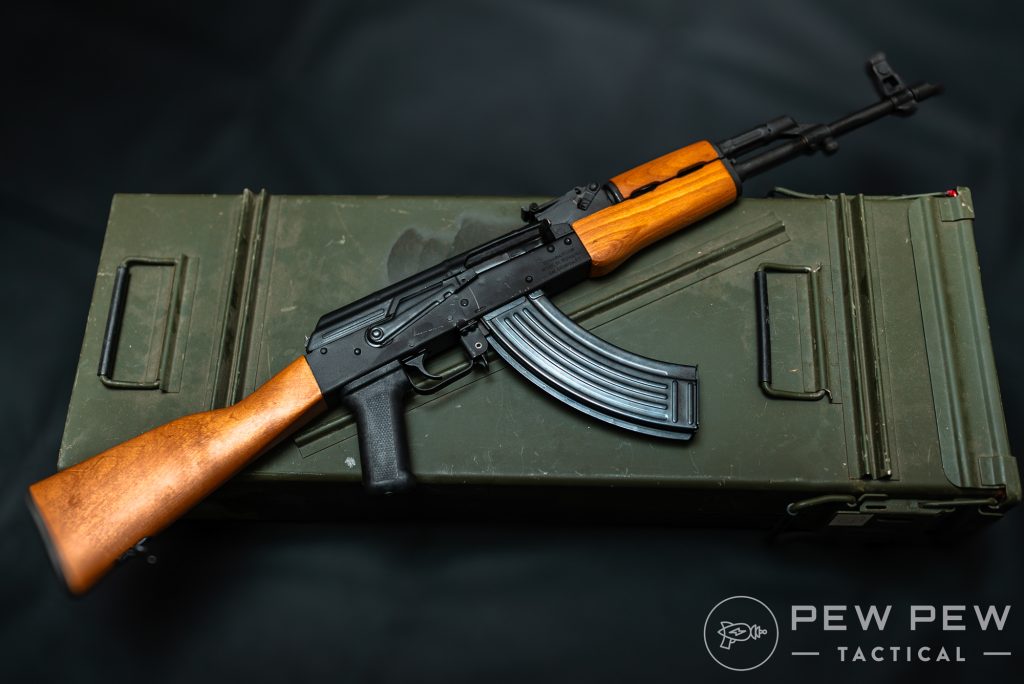
Yisrael Galili and Yakov Lior were inspired by the thousands of captured AK-47s that continued to run in such austere terrain, and the Galil was born shortly thereafter. The AK-47 inspiration is evident in its design.
Israel fielded the Galil in several variants from the 1970s to the 1990s before the M4 replaced it.
Shooting the JRA Gallant: Accuracy & Reliability Analysis
As mentioned, the Gallant is on the heavier side, and you notice this immediately. Shouldering it during testing, I began to feel some sincere fatigue as we got toward the end.
The rifle points well and shoulders nicely, but there is a positive side to that weight. Unmitigated recoil was extremely light.
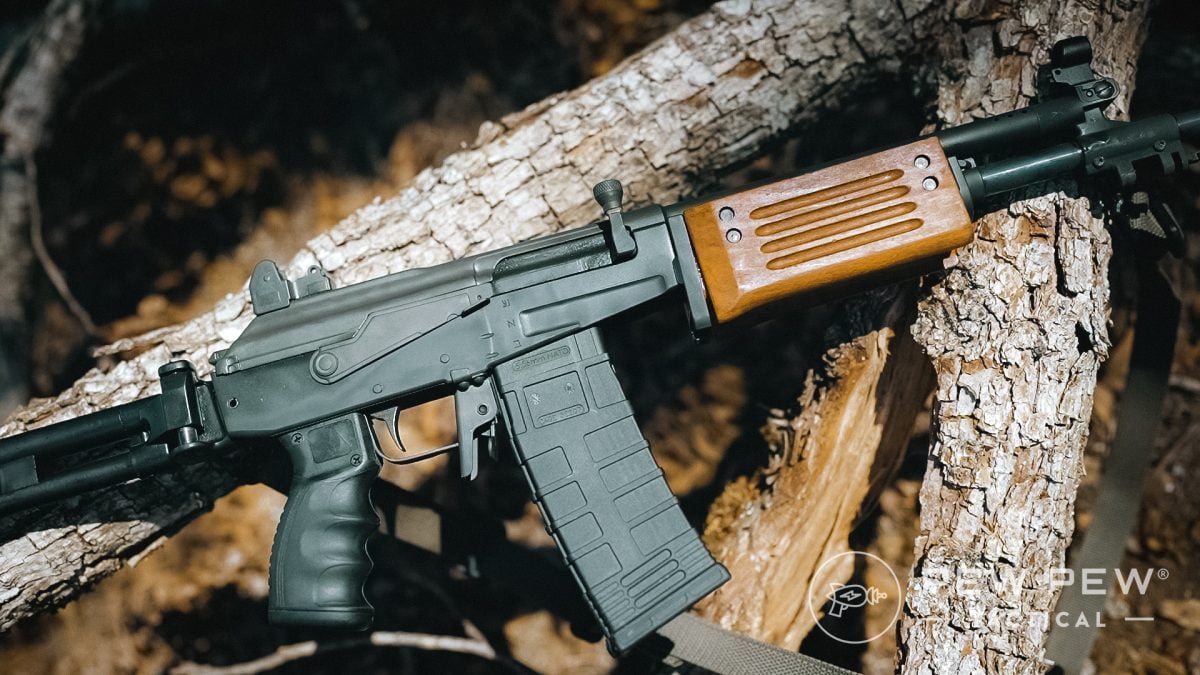
When I would cinch the rifle down snug, the recoil nearly disappeared. The heavier weight, combined with the relatively light cartridge 5.56, makes for a very flat shooting experience.
Testing this out on steel, I was able to hit doubles quite easily. Eventually, I put some triple-shots together without much struggle. The Gallant just eats it up.
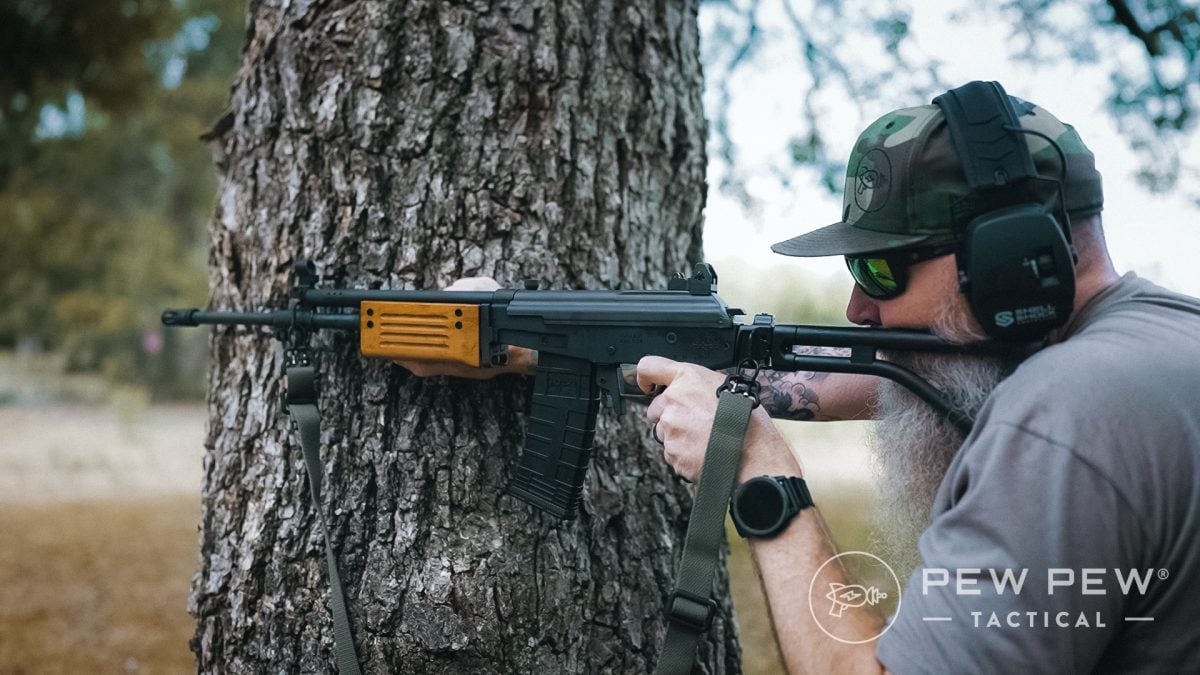
Another observation was the loudness of the Gallant. It sounds extra, like a short carbine or something similar.
There’s an A2-type birdcage on the end of the muzzle, but it doesn’t have the filled space normally oriented toward the bottom, which vents gases upward to counter muzzle rise. It clearly isn’t needed for that purpose.
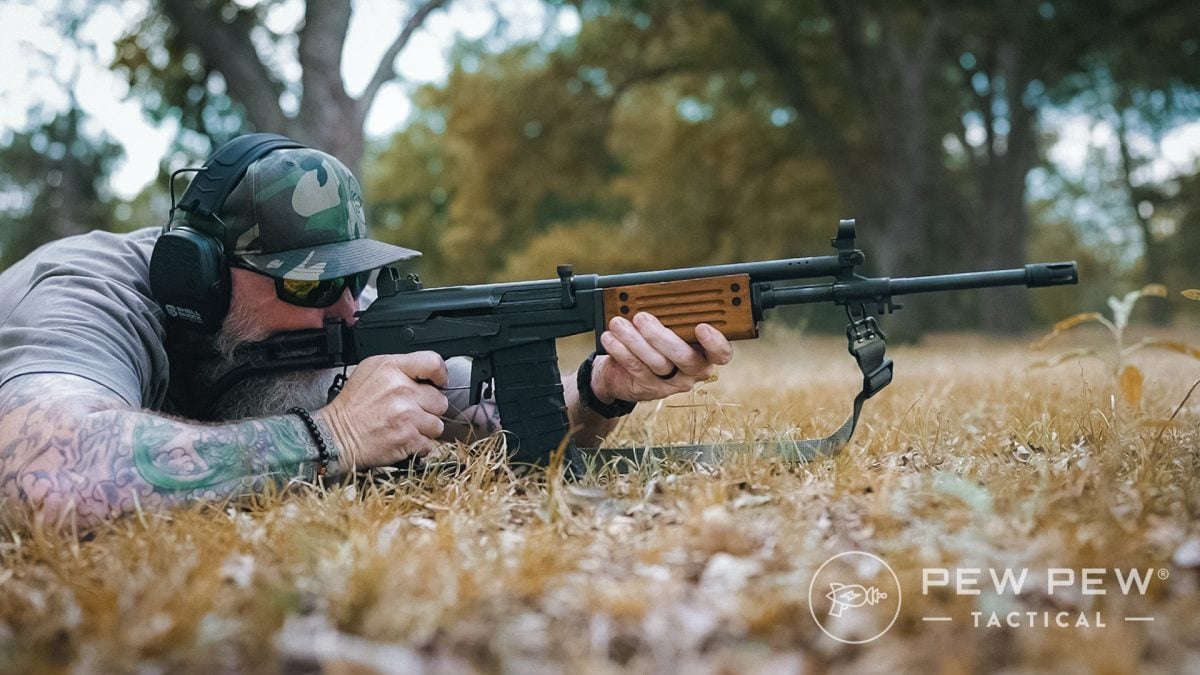
It was interesting going back to iron sights in such a big way. My plan was just figuring out where the rifle was hitting and not worrying too much about adjusting the sights.
I found that holding the front sight in the bottom right quadrant of each target got me good hits. The further out I was, the more I had to favor.
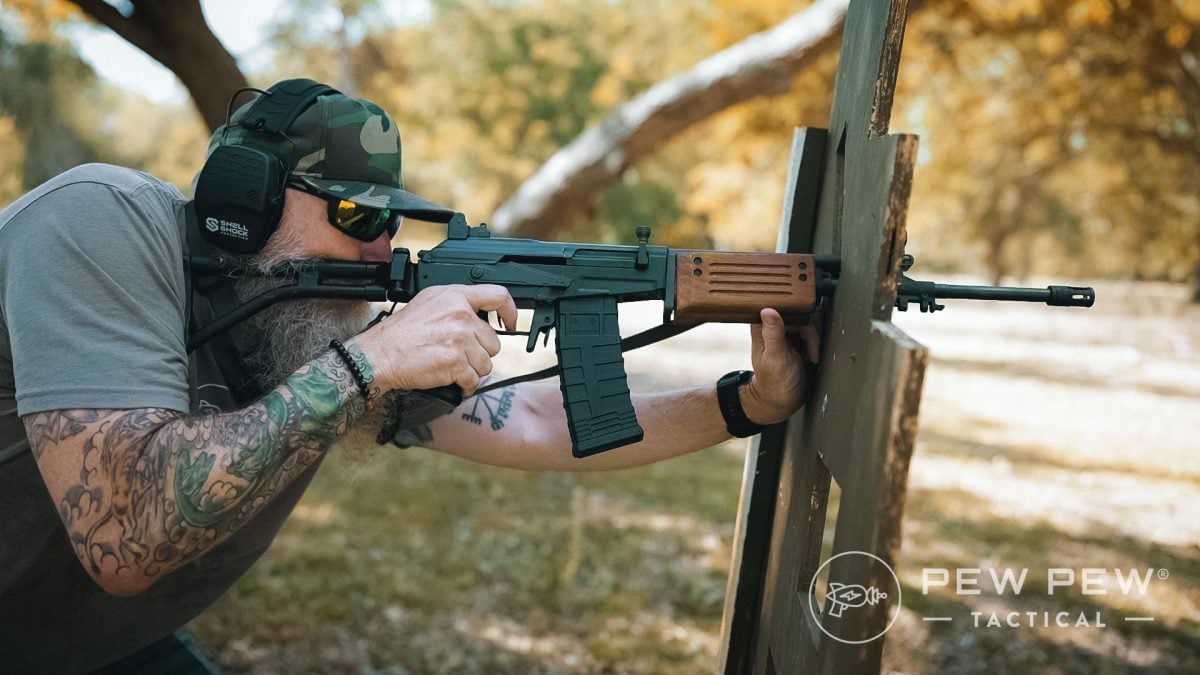
Shoving the muzzle through small slots on the VTAC barricades was challenging. Getting on target, aligning sights, and then breaking the shot showed me how rusty I was at those fundamentals.
It’s a good reminder of how much easier red dots make our lives. But we should also occasionally brush up on the old skills lest they rust up solid.
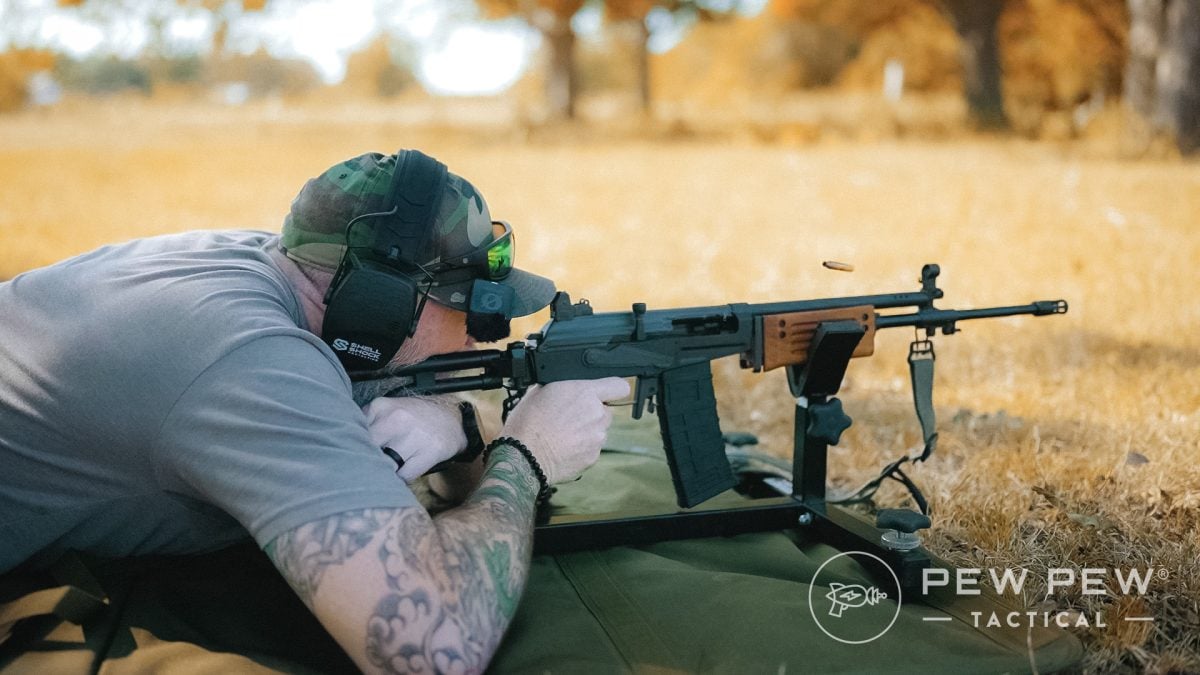
Regardless, I had good accuracy and was particularly impressed with shooting a group for MOA. I placed the Gallant in a CTK Precision P3 Ultimate Gun Vise at 100 yards and fired a couple of shots to see where I was hitting.
Once established, I fired five shots using 55gr AAC 5.56 FMJ. I was impressed to see a group just over 3 MOA when we inspected the target.
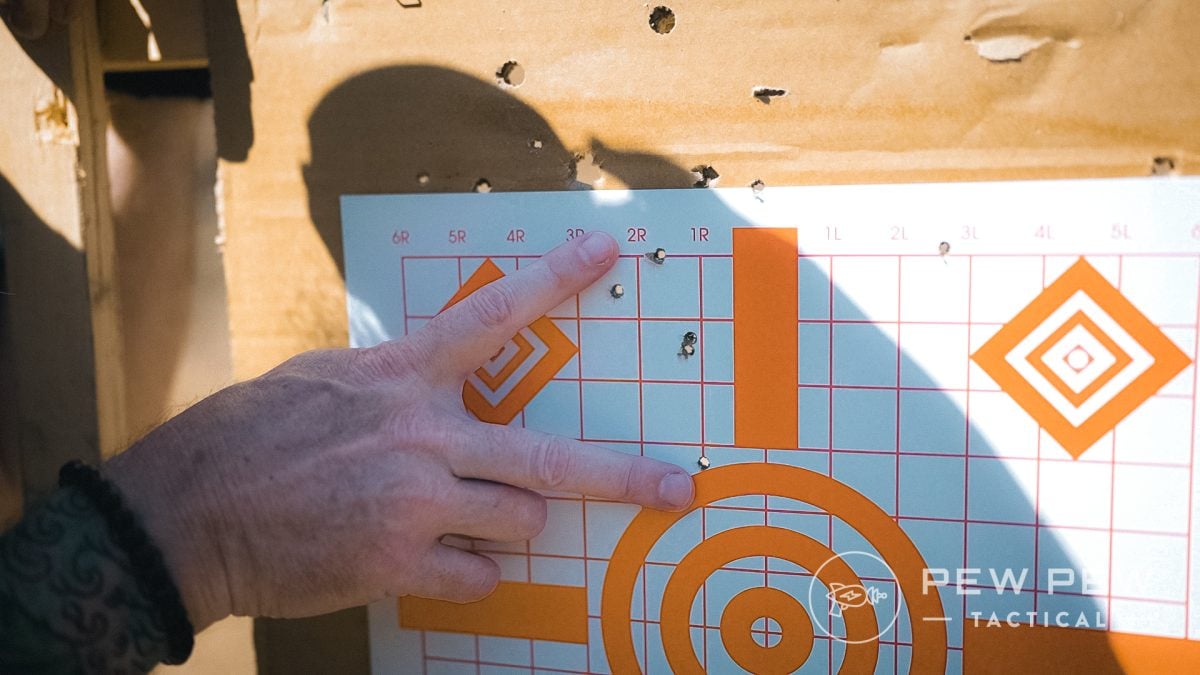
JRA’s website is pretty specific about using 5.56 only in the rifle, so I didn’t vary on the types of ammo we tested. Also relevant to this point, the Galil used a free-floating firing pin, which worked great for hard military primers.
JRA modified the Gallant to include a spring-loaded firing pin to better handle the softer primers in commercial ammunition. The modification also reduces the occurrence of slam fire.
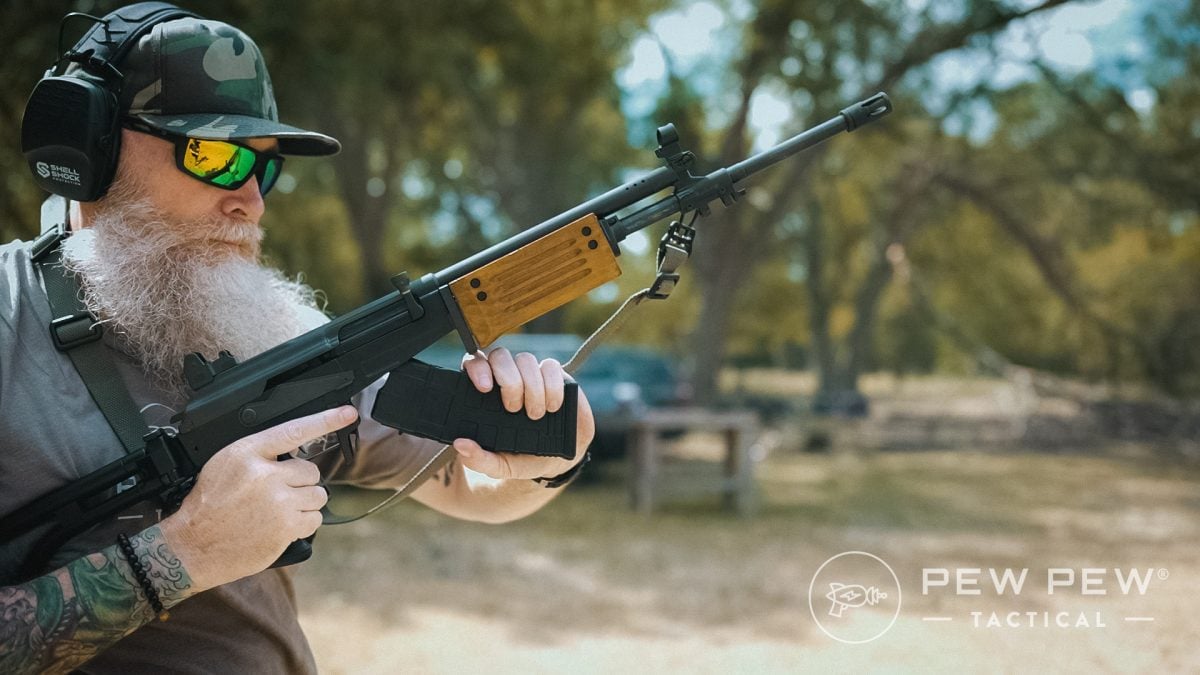
Regardless, the reliability was very good. There was only one malfunction in the 500 rounds we used during testing.
I pressed the trigger to find nothing happening, and upon inspection, noticed a casing sticking out in the classic stove pipe malfunction.
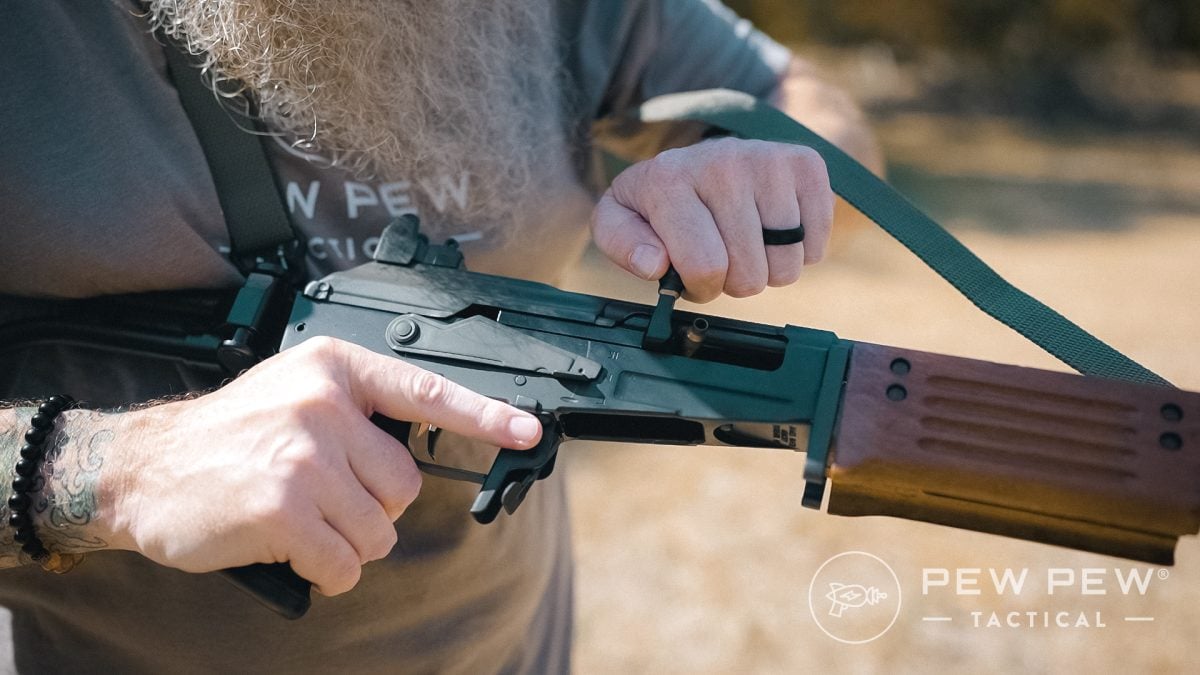
I pulled the magazine, racked the charging handle, and the casing, along with a chambered round, fell to the ground. That was somewhere between the 300-400 round mark, and it didn’t happen again.
Normally, the Gallant absolutely hucks empties away from the gun. The design doggedly continues to throw shells away in a consistent ejection pattern.
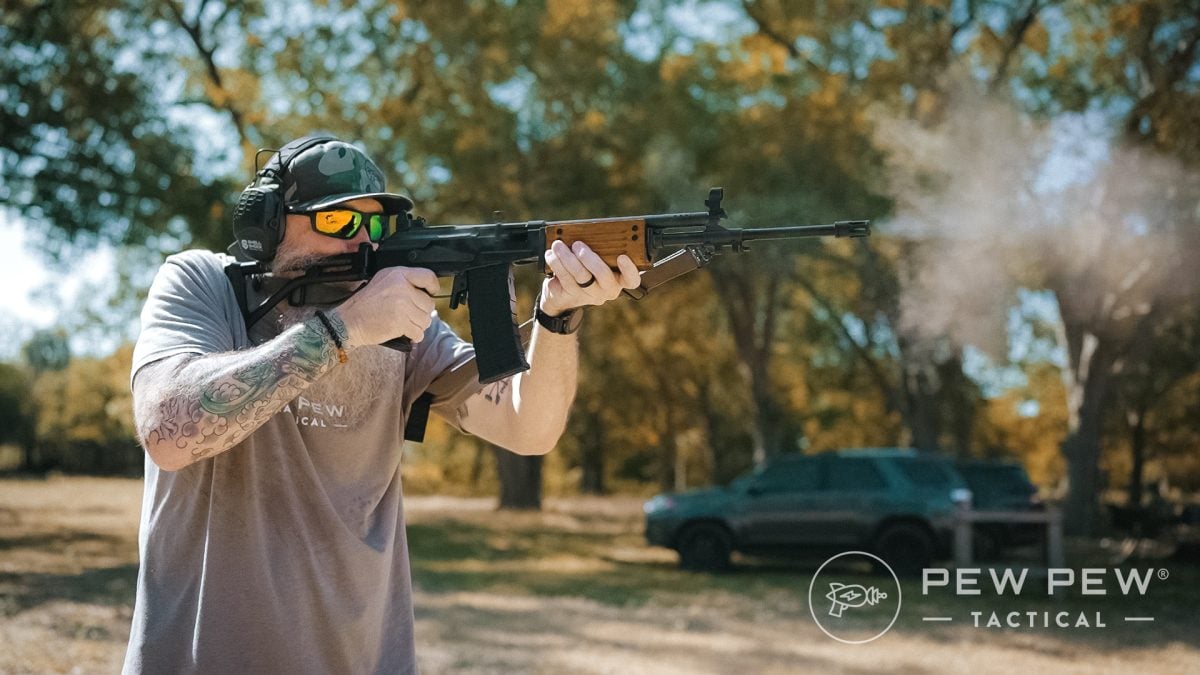
As we approached the 500-round mark, I noticed a couple of things. First, the Gallant was getting hot, and second, it was getting heavy!
Despite the low 90s temps and steady pace of fire, the Gallant never got too hot for me to handle. Many ARs in these conditions require the use of at least a glove on the left hand because the forend gets so hot.
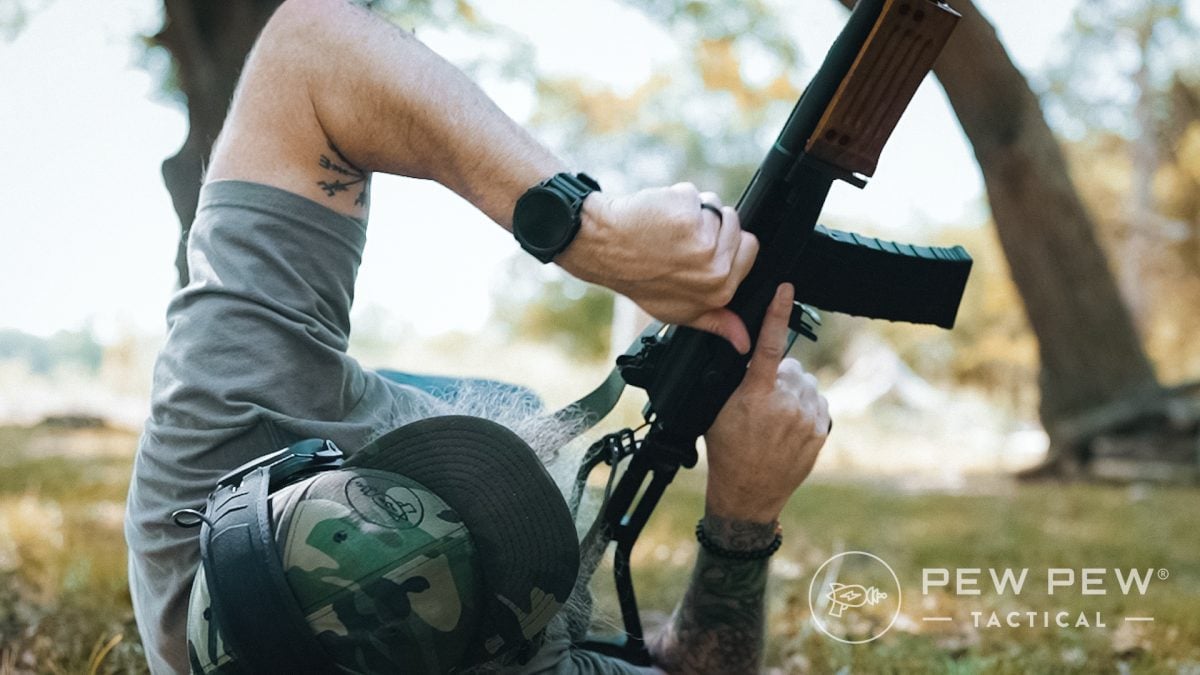
While I could feel the heat, that giant block of wood never even got close to getting too hot. I began to see the intelligence behind the design.
In the final magazines, my forearm began to cramp, but the Gallant kept on shooting. This was no surprise to me as I’d seen the guys at Classic Firearms torture testing this rifle in videos.
5.56 and .223 Ammo in Stock
Ergonomics: Fit & Feel
When I pick up a firearm made mostly with wood and metal, I feel a certain amount of nostalgia. The Gallant evokes the same sentimentality.
One of the first things I noticed was that the forend feels like a slightly more refined piece of 2×4 placed forward of the magwell.
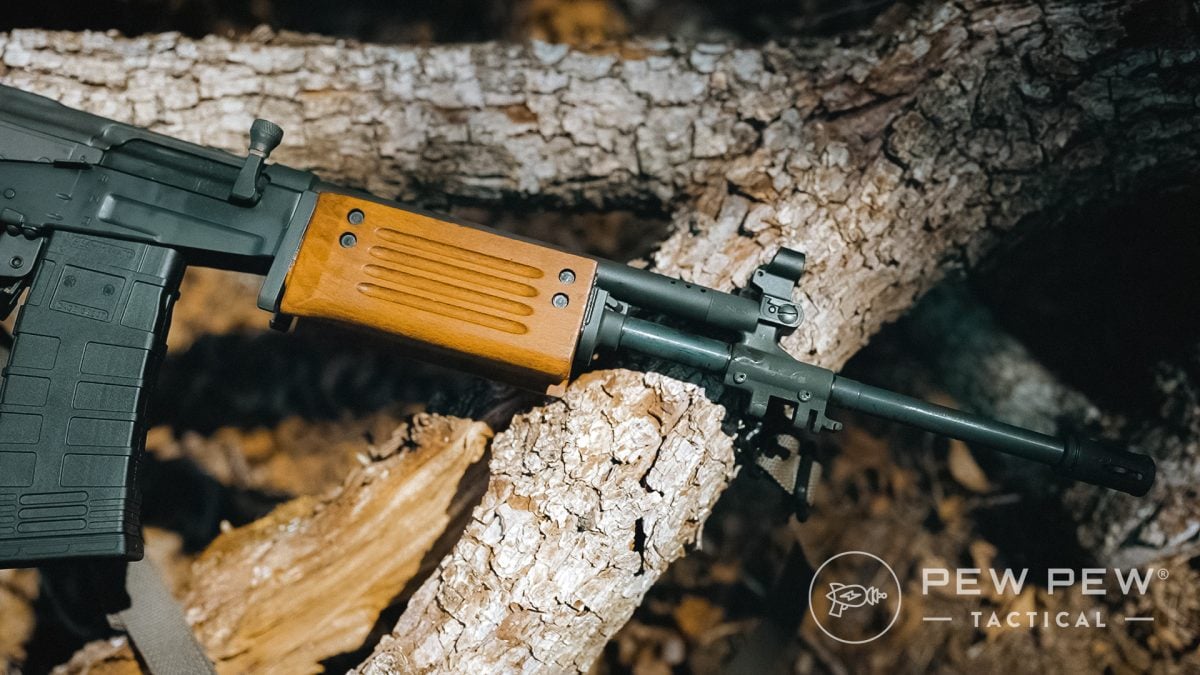
The next thing I realized was how comfortable the grip was in my hand. The finger grooves in this plastic piece are very generous and fit my large hand nicely.
The third point of contact was the butt plate, an unforgiving, non-padded piece of aluminum cut with horizontal lines to stay in your shoulder pocket. It didn’t feel bad at the time, but I noticed some light bruising on my collarbone later.
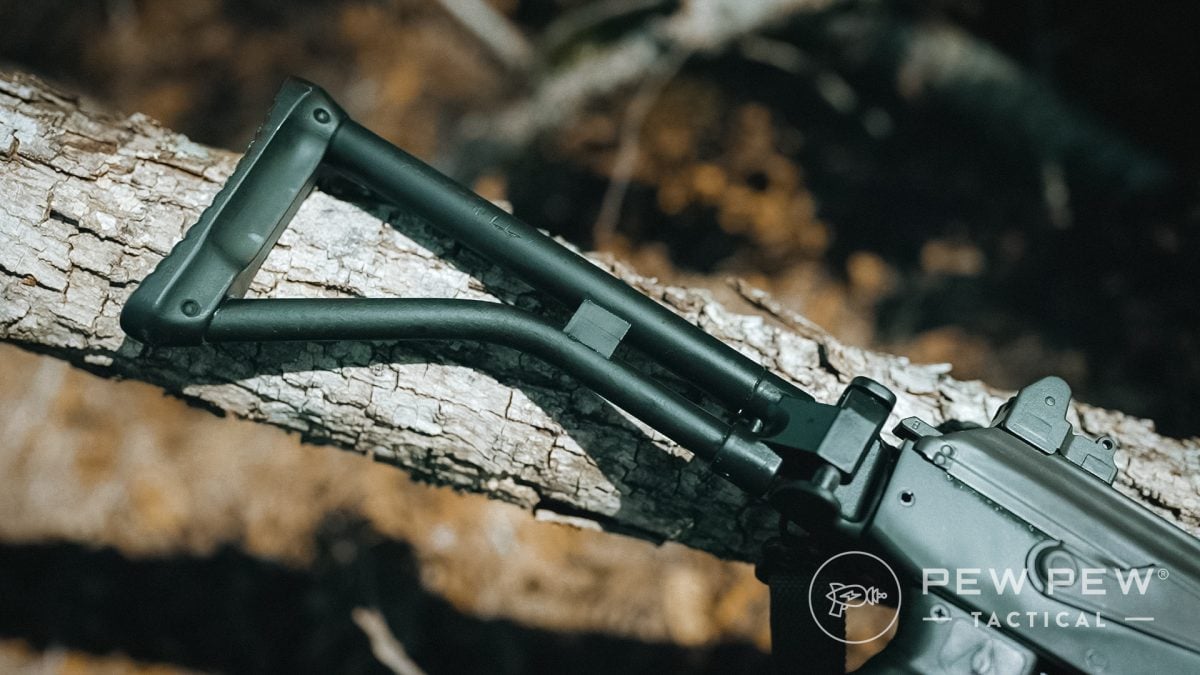
And then, the heft. It’s not bad at first, all things considered. But when I reached the 400-round mark, I truly began to appreciate how heavy the gun felt.
The sights are definitely old school. The rear has a collared dual diopter for close engagements, or far as the case may be.
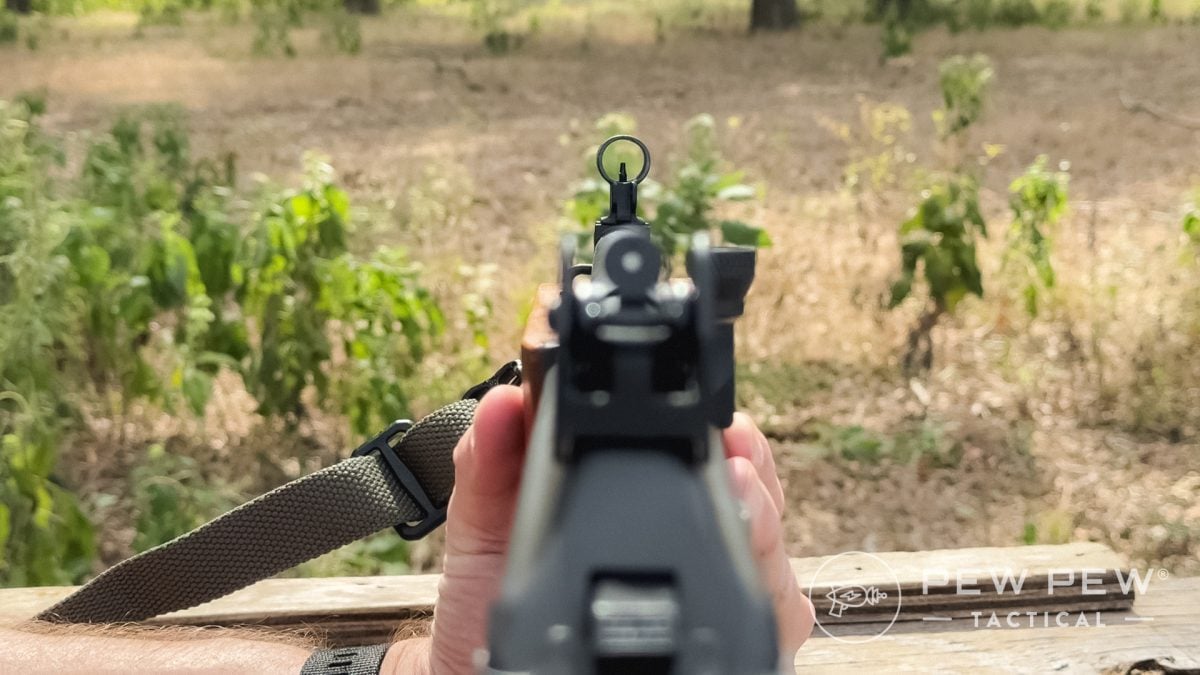
The front is a singular post that is shrouded in a round hood. This assembly can be adjusted for better accuracy, but both sights are well protected from accidental damage or misalignment.
Feeding the Gallant, I used the Tapco 30-round magazine provided. This setup is very much like the AK-47, utilizing the rock and lock action of first hooking the front lip, then pulling the magazine back until it clicks into place.
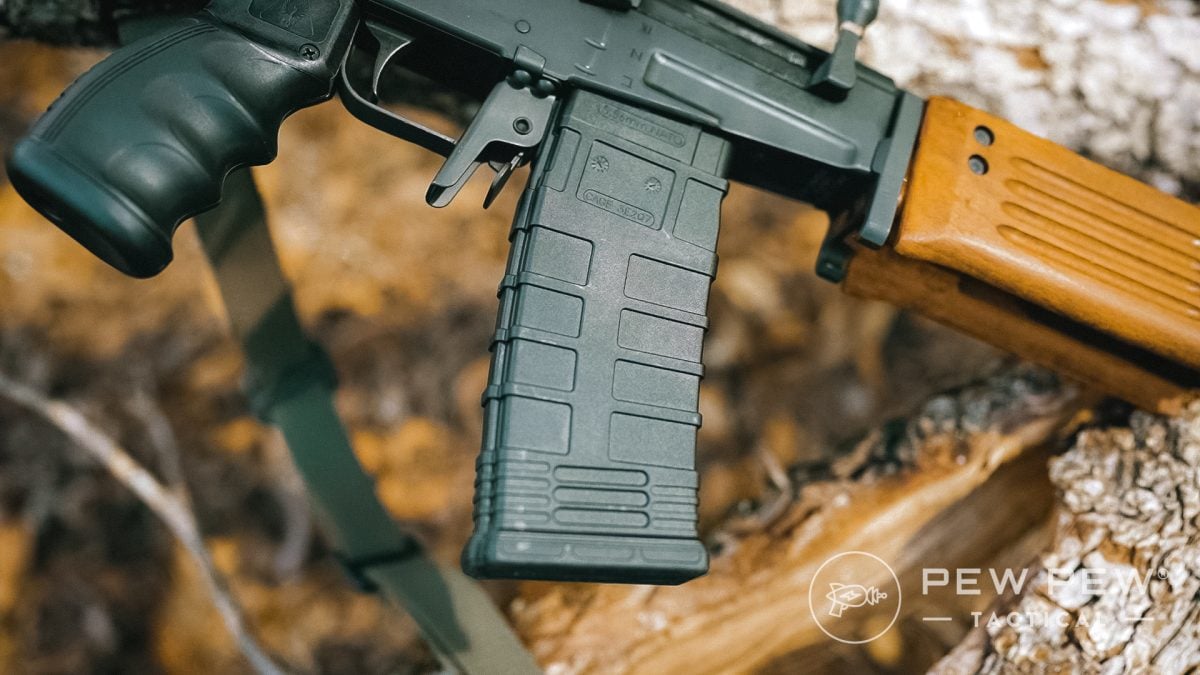
The clearance here felt pretty close at first, and I struggled to get reloads down quickly. I’m happy to report that by my last reload, I was doing pretty well, so it gets faster with practice.
The Tapcos loaded nicely once I figured out the angle of approach, and dropped okay, but had to be pulled from the receiver because of the design. In addition, there is a lip that hangs forward of the trigger guard, which feels like the magazine release.
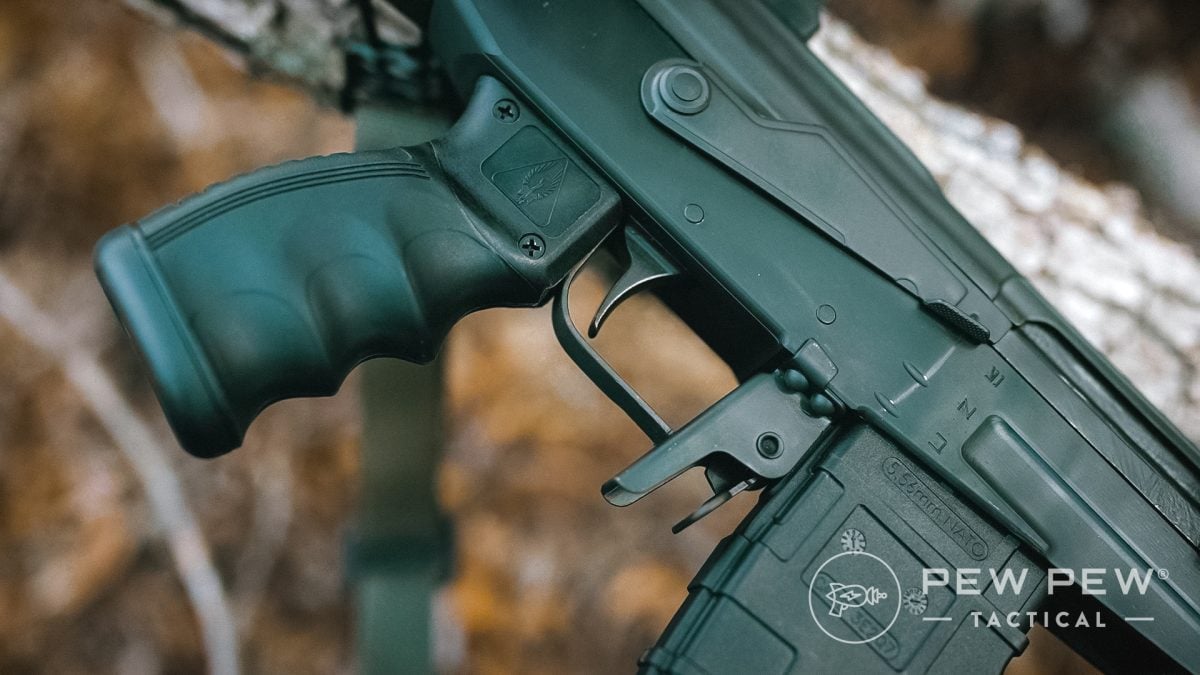
This makes finding the magazine release a little more challenging because it’s in a narrow window between the magazine and this shroud that protects the magazine release. Again, practice is everything.
Another noteworthy observation was that, like the AK-47, your indication of empty is a click and no bang. After dumping the magazine and loading a fresh one, you then have to reach over and run the charging handle to start shooting again.
Controls
My head kept wanting to draw comparisons between the Gallant and an AK-47, but several things were different enough to draw a distinction. For example, the right side of the receiver features an AK-style fire selector with a long lever.
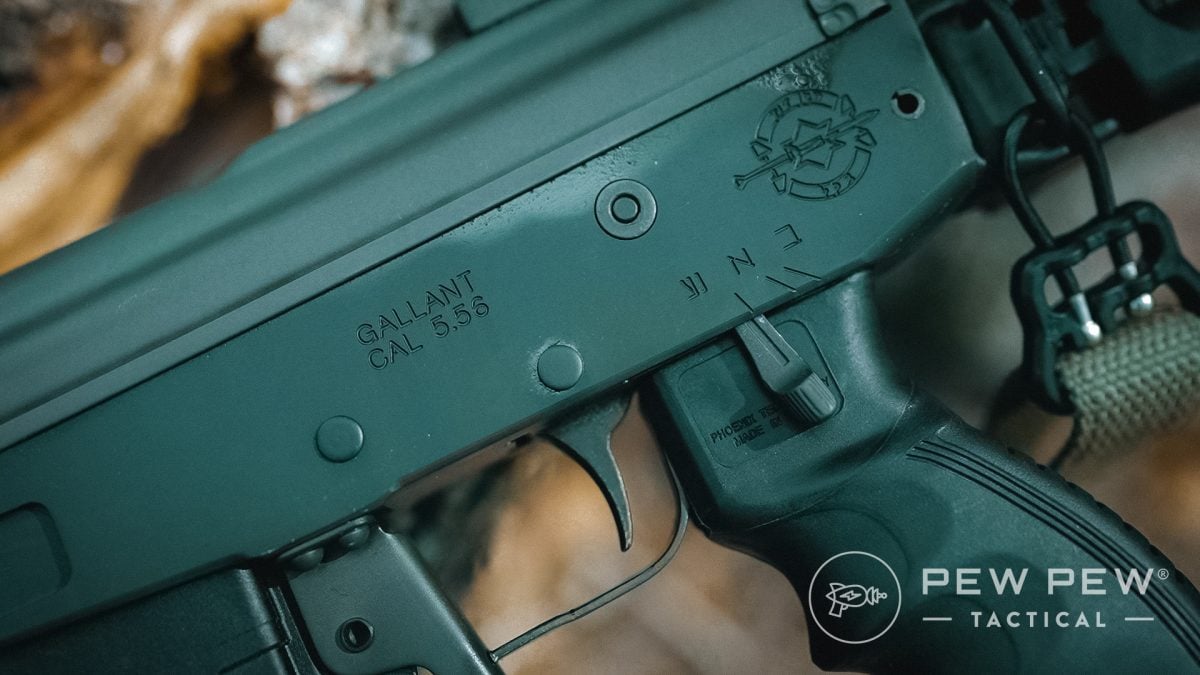
While this was a bit of a reach for me, the Gallant comes with a reciprocal thumb switch on the left of the grip. This allows the shooter to work through the positions with just the thumb.
The thumb selector was a lot easier to manipulate and drew upon some manual of arms muscle memory from the M4. I ended up using this almost exclusively during testing.
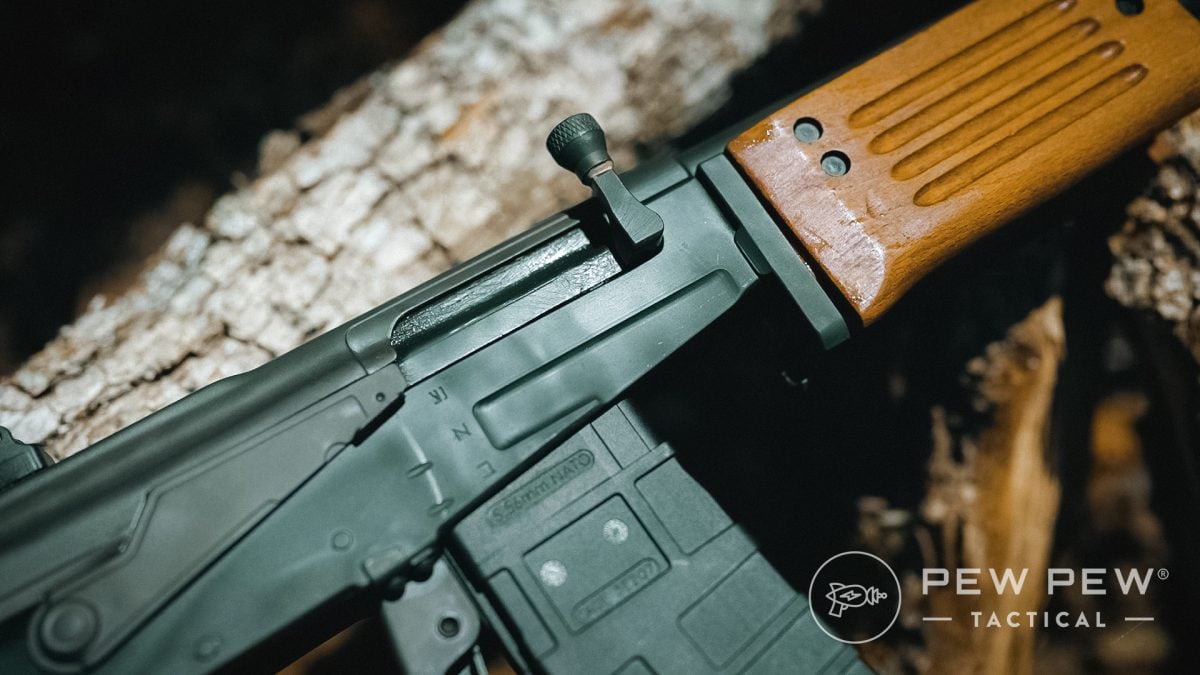
Instead of the hook-like charging handle found on the AK-47, the Gallant uses a straight-up vertical lever with a fattened knob rising above the dust cover. This provides less ambiguity on manual arms and lends itself to reaching over for reloads, rather than under.
The trigger in the Gallant was surprisingly good. Upon initiating backward pressure, there is immediate resistance, and the shoe travels back a few millimeters before breaking crisply.
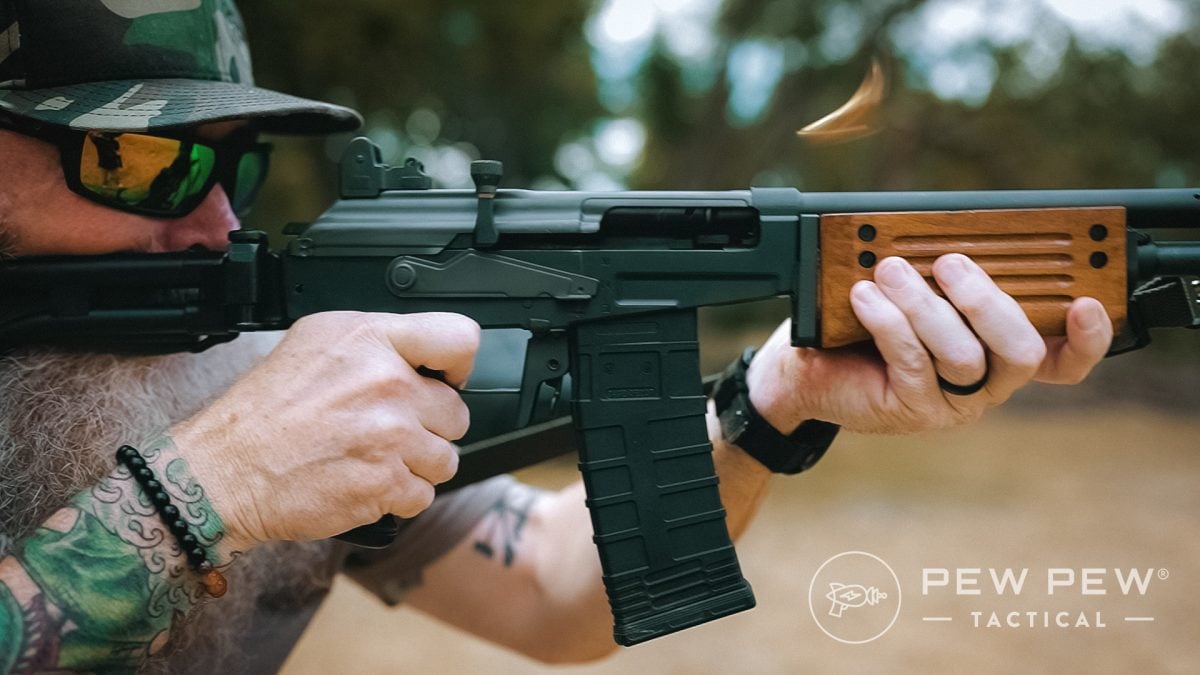
This averaged 2 lbs. 3.5 oz. on a Lyman digital gauge. Reset was authoritative, and happened as soon as I released the trigger.
Who Is It For?
This is a Cold War-era, long-stroke gas piston system, semi-auto battle rifle with an interesting pedigree. It started life as a Galil but came to America and was fitted with a new receiver and barrel.
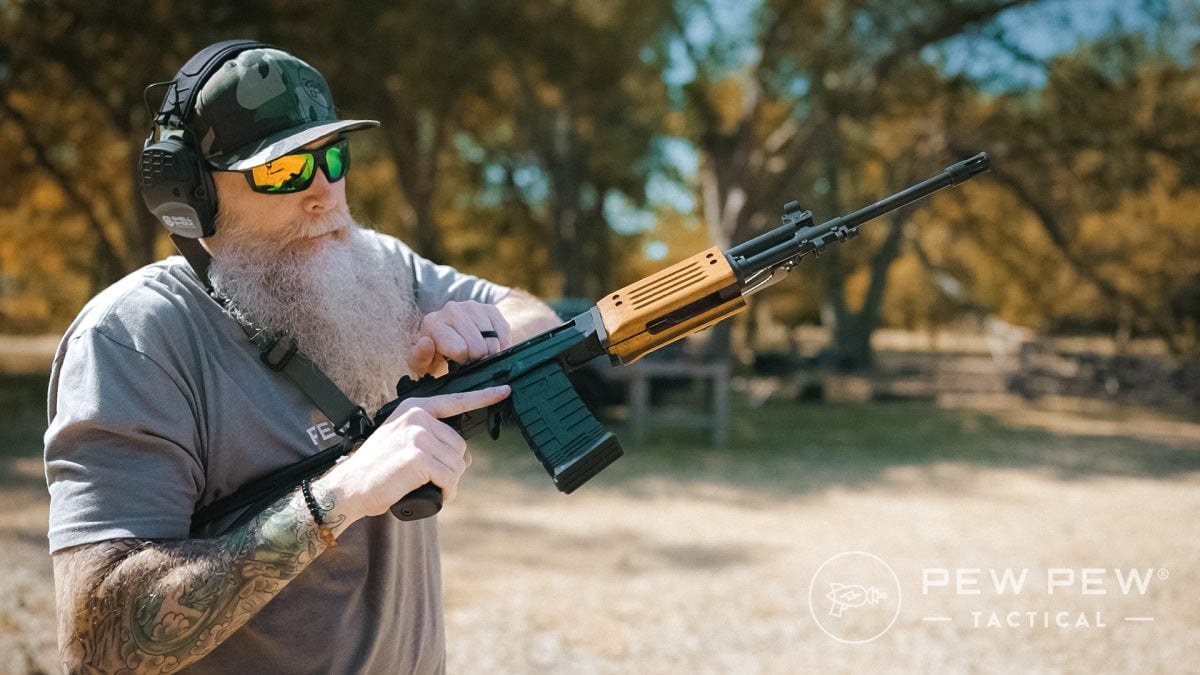
The JRA Gallant blurs the lines between categories like Milsurp and Retro.
Its caliber and design fit more of a collector/milsurp aesthetic, though the Gallant could be employed in defensive scenarios for lack of a better (read lighter) option. The Gallant is not well-suited to larger game hunting, though it could be employed for varminting.
By the Numbers
Reliability: 4.5/5
The Gallant was a real trooper, running through 500 rounds with only one stovepipe that was not repeated.
Ergonomics: 3/5
The forend block is not the most ergonomic, but it serves its purpose well and protects the shooter from heat. The grip was great, and the (left) controls are easy to reach.
Accuracy: 3/5
Just over 3 MOA is great for a battle rifle. No doubt the rifle is actually more accurate, but with no glass and your humble narrator shooting, I’ll take it.
Customization: 2/5
Here, the Gallant loses some points because there isn’t a whole lot you can do to customize it. There are Galil furniture kits and a handful of accessories, but you’ve got to remember this is a Cold War-era rifle—made before kitting out guns was cool.
Value: 3.5/5
You can still buy an IWI Galil, but they are, on average, double the cost of the Gallant. This makes it a great value for the money.
Overall: 3/5
Prices accurate at time of writing
Prices accurate at time of writing
-
25% off all OAKLEY products - OAKLEY25
Copied! Visit Merchant
Upgrades for the JRA Gallant
The Gallant is a little extra loud, so you’ll want good ear pro to protect your hearing. Pick up some Shell Shock, you’ll thank me later!
Prices accurate at time of writing
Prices accurate at time of writing
-
25% off all OAKLEY products - OAKLEY25
Copied! Visit Merchant
For this review, we used a Blue Force Gear Vickers sling, outfitted with their U-Loop attachment. It’s crucial to have a sling on a heavier gun.
Prices accurate at time of writing
Prices accurate at time of writing
-
25% off all OAKLEY products - OAKLEY25
Copied! Visit Merchant
Ammunition that is accurate, reliable, and inexpensive reminds me of Goldilocks and the Three Bears, because it’s just right.
Prices accurate at time of writing
Prices accurate at time of writing
-
25% off all OAKLEY products - OAKLEY25
Copied! Visit Merchant
Meet the Experts
For this review, we tested the Gallant with iron sights only, shooting 5-round groups at 100 yards for accuracy. We went through 500 rounds of ammunition, using AAC 55gr 5.56mm for durability testing. We also tested the trigger on the Gallant with a Lyman Digital Trigger gauge to get an accurate assessment of the actual trigger pull weight.
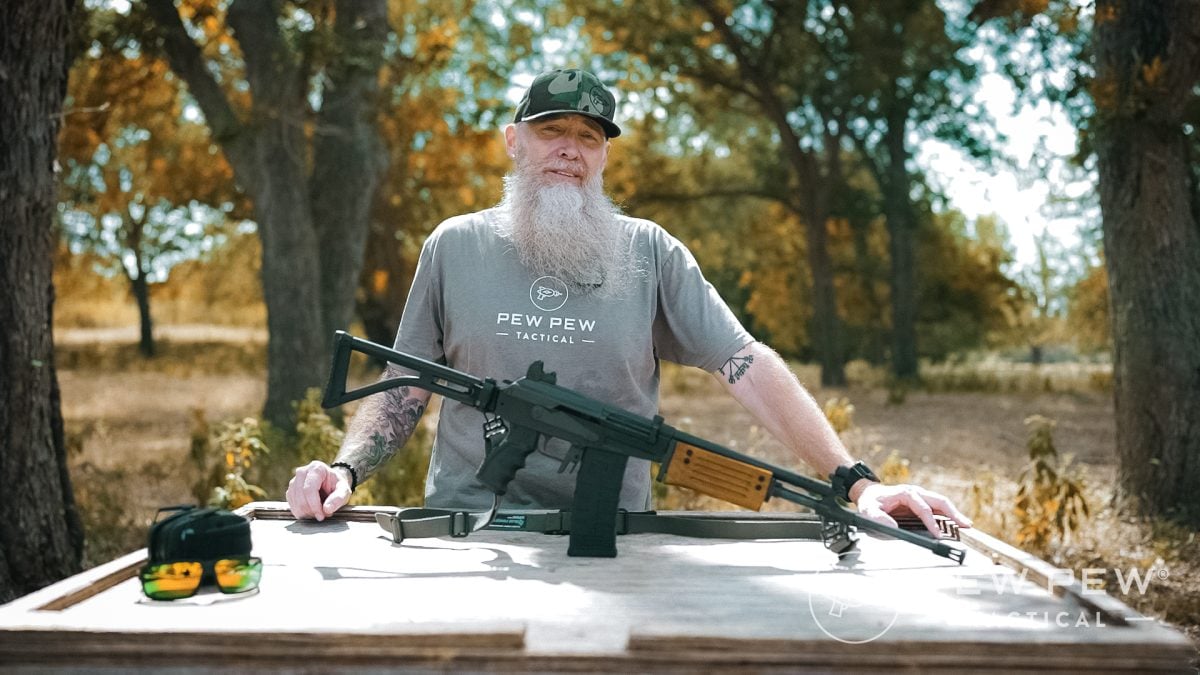
At the helm of this review was Pew Pew Tactical Content Producer Sean Curtis. Sean has been shooting since childhood, but really began to delve into guns more during his law enforcement career. He spent over two decades in law enforcement, where he became a POST-certified handgun instructor and NLEFIA Red Dot Instructor and received CLEFIA Advanced Firearms Instructor Training and AR-15 armorer training. He has since attended a variety of training, including Tactical Performance Center Handgun Mastery & Carbine Mastery, and earned USCCA rifle instructor certification. Aside from training and prior to joining the Pew Pew Tactical team full-time, Sean wrote for several gun publications evaluating and testing guns and gear and has written hundreds of articles.
This review was edited by Editor-in-Chief Jacki Billings, who runs Pew Pew Tactical’s experienced team of reviewers. Jacki is a member of the Society of Professional Journalists, ACES: Society for Editing, and the Professional Outdoor Media Association and has her bachelor’s degree in Mass Communications. She has worked as a media professional for close to 20 years, specializing in gun media for almost 10 years, and has worked as an editor for five years. She uses her extensive professional journalism and editing experience to set testing protocols and editorial standards.
Final Verdict on the JRA Gallant
From the outset, I wasn’t sure what to expect when I learned I’d be reviewing the Gallant. I’m pleased to say that by the end, I understood the gun a lot better and why the designers made several choices after firing 500 rounds.
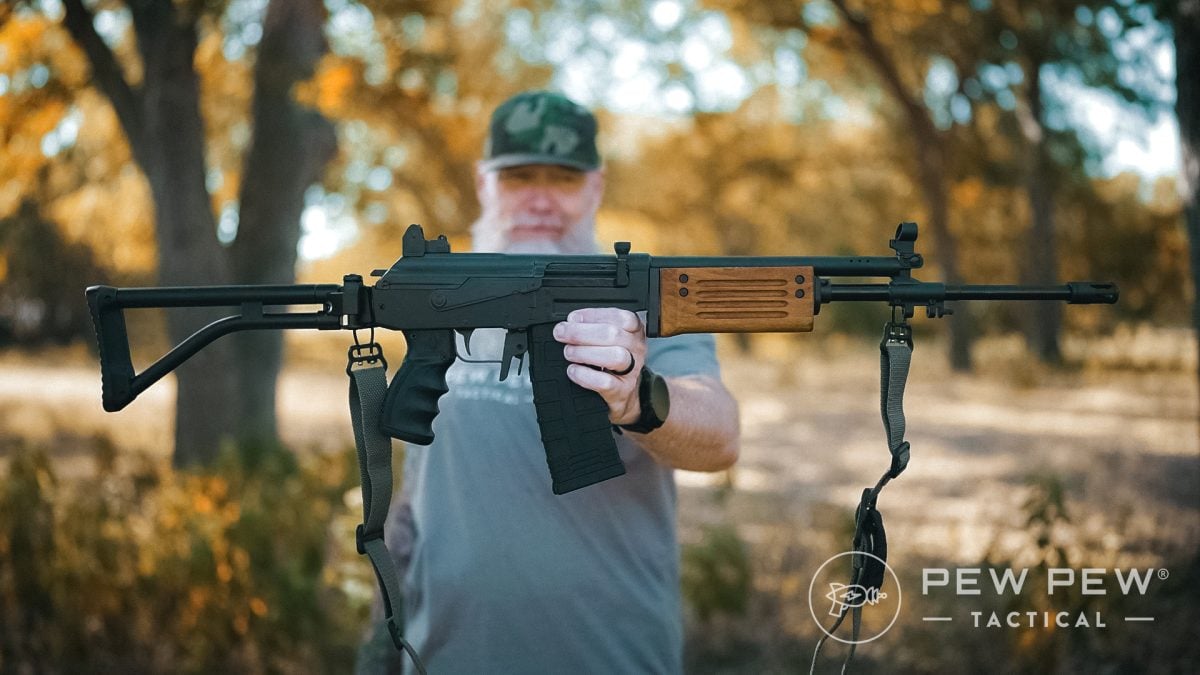
The JRA Gallant is accurate, reliable, and heavy enough to lay down fire without much recoil or worry about overheating. It’s a Cold War-era gun, based on the AK-47, that drips with Old School Cool.
What do you think of the JRA Gallant? Sound off in the comments below. On the hunt for more AK-style rifles? We have a full round-up of our top recommendations in the Best AK-47s.

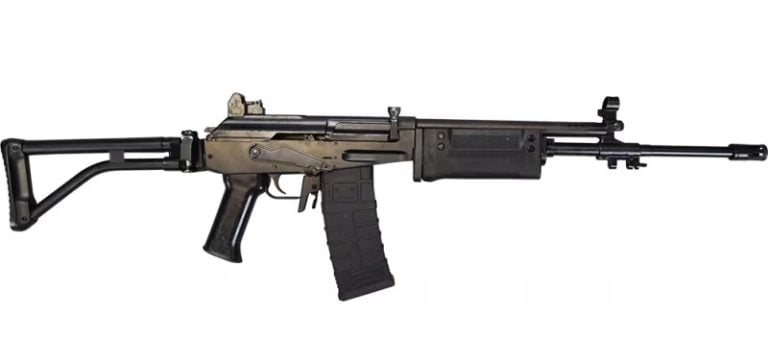

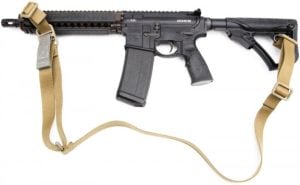
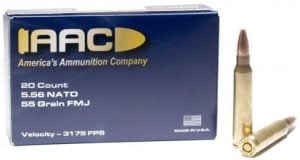










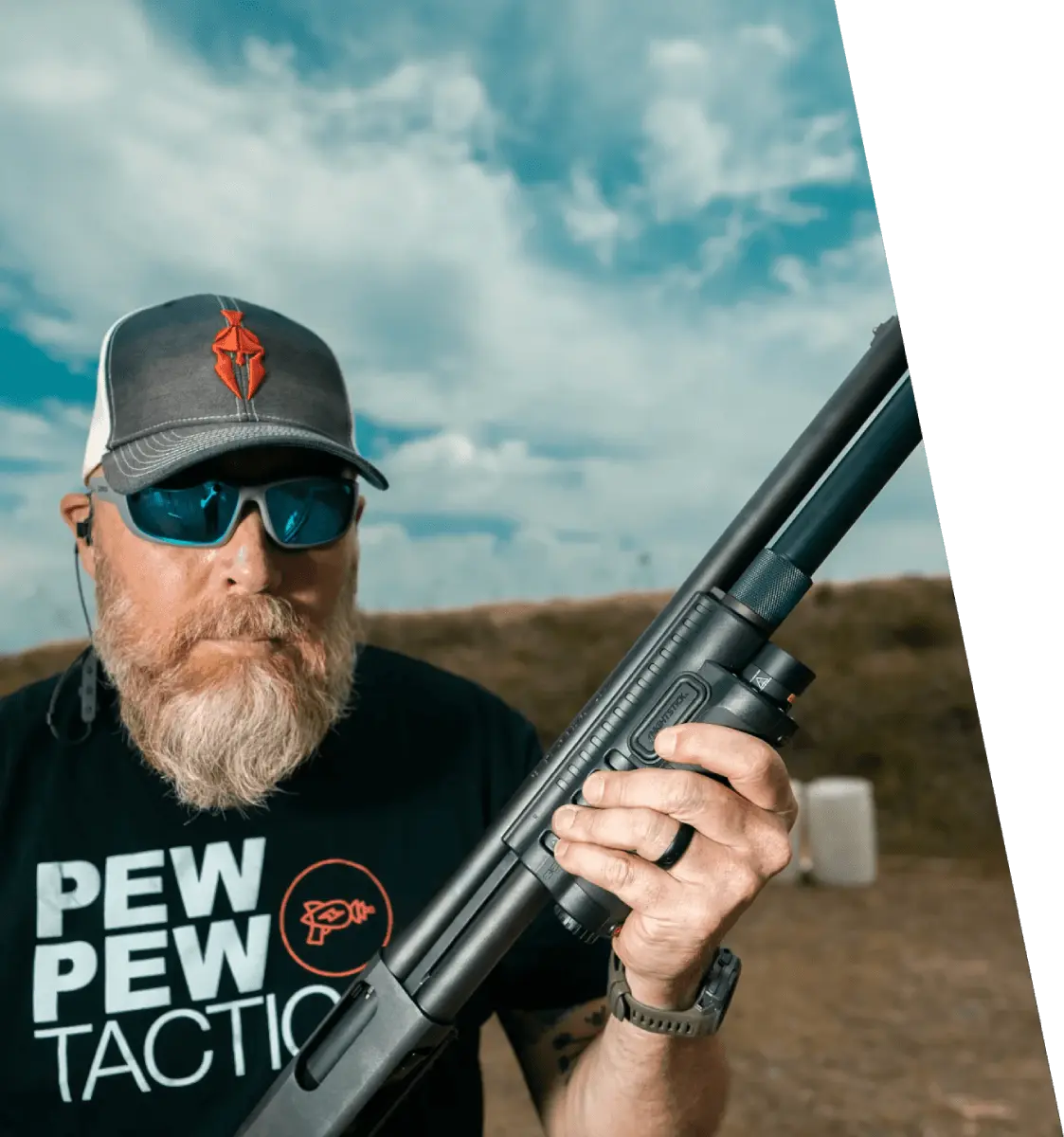

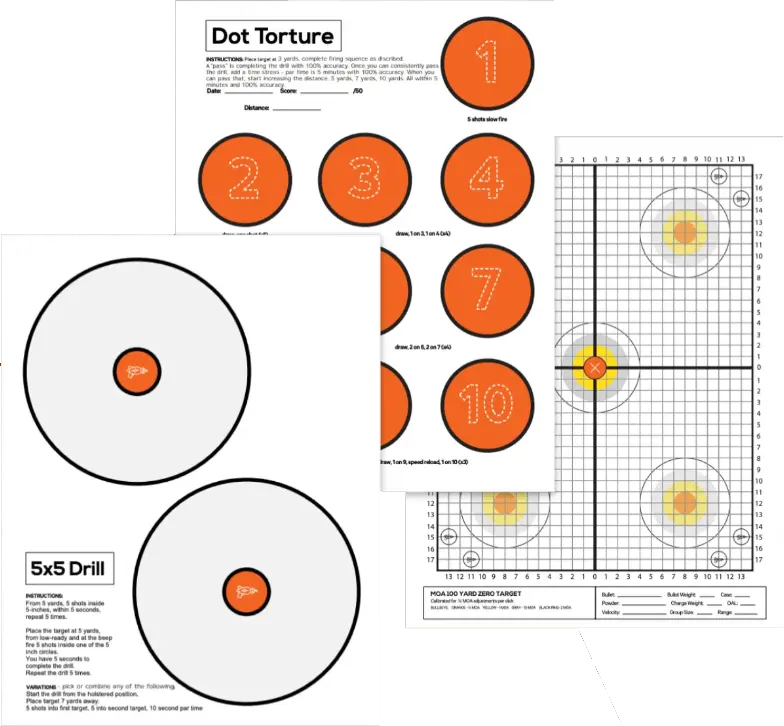
12 Leave a Reply
I carried the short Galil (Gallion) w the M203 attached. For 10 years. Heavy . Yes accurate not as good as it should have been but it got the job done and done well and at $900+- it's a bargain
Rather than relying on Tapco magazines which are frequently of questionable quality, you can go to Natchez gun parts & order genuine Galil mags…not as economical as they used to be, but they are super reliable!
Good point. I ordered IWI Galil mags and they did not fit.
Nothing from an apartheid state for me thanks.
I've got one of the original '80s IWI Galil (גליל) ARM in .308 caliber. It's my favorite "battle rifle" & is always generates a lot of interest at the range. Very few in that caliber were ever imported & a nice example goes for $6K when you can find one. It runs circles around any FAL ever made...
Very nice. I could imagine this gun doing very well in .308. The pricing is wild, but I guess we're the ones who determine market value.
It's nice to finally see a gas piston for under four figures. The FN SCAR has dominated too long. Trouble with any new gun is customization. Direct impingement AR's can be built from nuts and bolts any way you want rather cheaply. Once we get enough gas pistons, hopefully the options will be similar. We must never forget every gun made is a compromise...to get something, you have to give something. The legendary AK battlefield performance comes from last century looser tolerances, thus the accuracy suffers, but still gives good combat hits. Gas pistons run cleaner but still require good maintenance, so we all know a clean gun is a reliable one. The big question is will they eventually replace direct impingement? Only time will tell.
Eloquently stated Raymond! It's interesting that the FN FAL inadvertently caused the creation of the Galil, inspired by the AK. And you're totally correct, there's a series of compromises with each build, but reliability was the key element behind this gun's creation.
I carried the short Galil (Galilon) with an M203 for most of my service in the IDF loved it. Once you got the rear sight on the cover tightened up you were spot on ..
I'm liking the price on this clone
Oh man, I can't imagine that combo being very light. Well done!
I did military service (2 years) in South Africa in the 1980s. Our standard issue rifle to all Infantry units was the R4 and the sorter barrelled R5 for armoured units. They were Galils made under license for the South African Defence Force and looked just like the rifle reviewed in the article. They saw a great deal of action in the Angolan war and were extremely robust and reliable. Thanks, as always, for a great article.
Thanks Hulme, I really appreciate when readers with extensive time on the guns we review chime in. It's particularly important when you consider our testing is brief compared to the long-term knowledge gained from conflicts like that.
Thank you! I lean heavily on the works of a great editor!